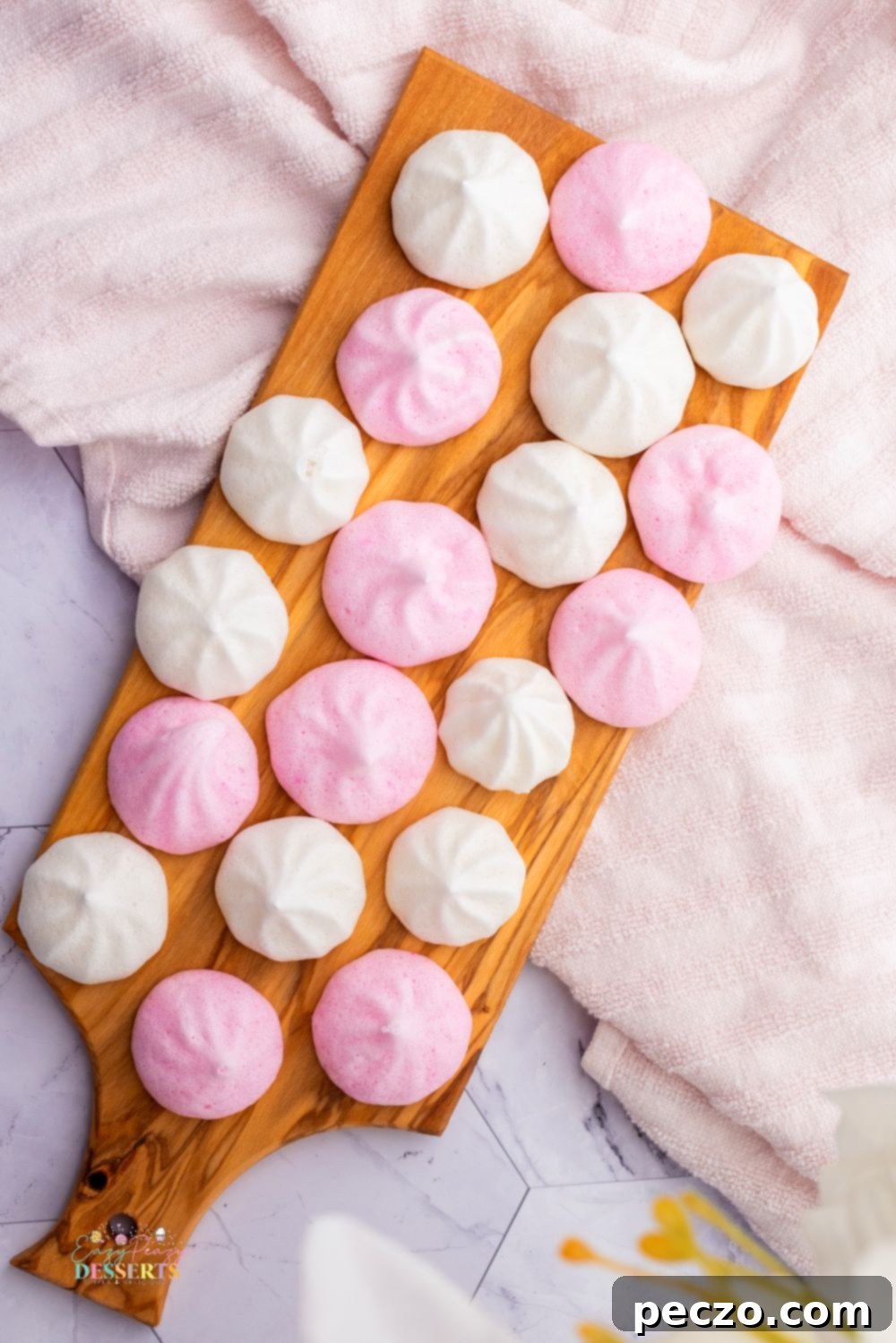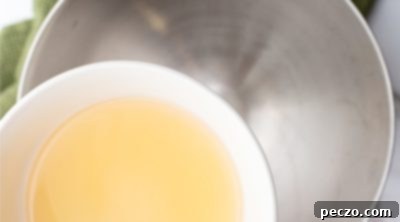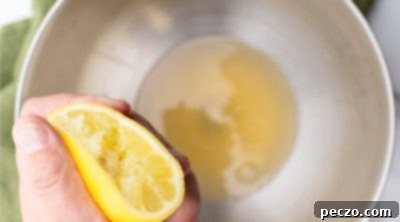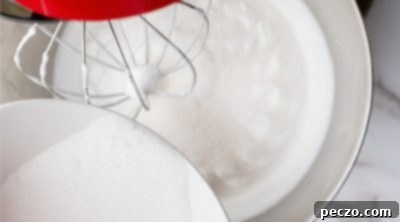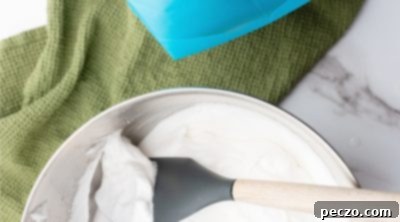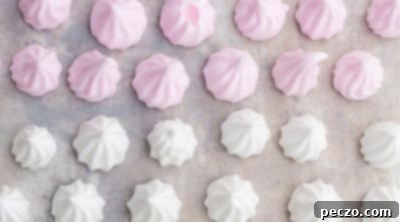Mastering Vegan Meringues: Your Guide to Crispy, Chewy, and Egg-Free Aquafaba Cookies
For many, the delicate crispness and melt-in-your-mouth sweetness of a meringue cookie evoke pure culinary joy. Traditionally, these ethereal treats rely heavily on egg whites, making them off-limits for anyone following a vegan or egg-free diet. But what if we told you that you don’t have to miss out on this classic dessert? Get ready to transform your perception of plant-based baking with our incredible recipe for vegan meringue cookies! These delightful bites capture everything you love about conventional meringues – from their airy texture to their light sweetness – all without a single animal product. You’ll be utterly amazed at how indistinguishable they are from their traditional counterparts.
The Magic of Vegan Meringues: A Sweet Revolution
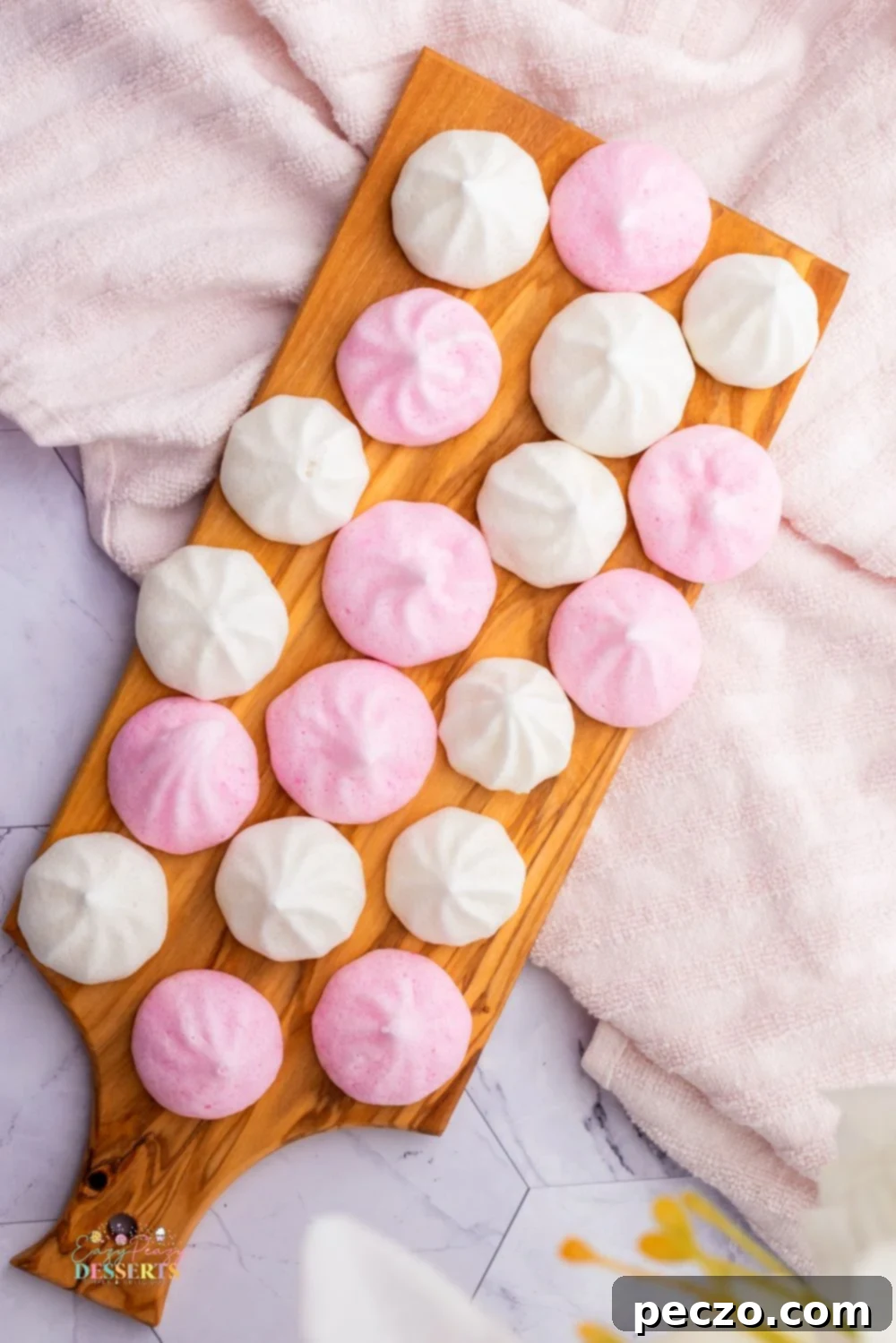
Meringue cookies are more than just a dessert; they’re a celebration of simplicity and elegance. Our vegan meringue cookies bring this joy to everyone, regardless of dietary choices. This innovative recipe uses a surprising, yet incredibly effective, ingredient to replace egg whites, opening up a world of possibilities for plant-based baking. Whether you’re hosting a holiday gathering, looking for a light after-dinner treat, or simply craving something sweet and satisfying, these aquafaba meringue cookies are an absolute game-changer. They’re incredibly easy to make, requiring minimal ingredients, and deliver on taste, texture, and visual appeal. Prepare to impress both vegan and non-vegan friends and family alike with these irresistible delights!
Why Choose Vegan Meringues?
Beyond catering to dietary preferences, choosing vegan meringues offers several advantages. Firstly, they provide a fantastic option for those with egg allergies, making a beloved dessert accessible. Secondly, they’re often perceived as a lighter alternative to many traditional desserts, allowing for guilt-free indulgence. The primary ingredient, aquafaba, is not only plant-based but also an excellent way to reduce food waste by utilizing a byproduct of chickpea preparation. This recipe proves that you don’t need animal products to achieve extraordinary flavors and textures in your baking.
Other Vegan Desserts You Will Love
- Orange Cranberry Muffins
- Pumpkin Maple Glaze Donuts
- Baked Cinnamon Donuts
- Homemade Applesauce
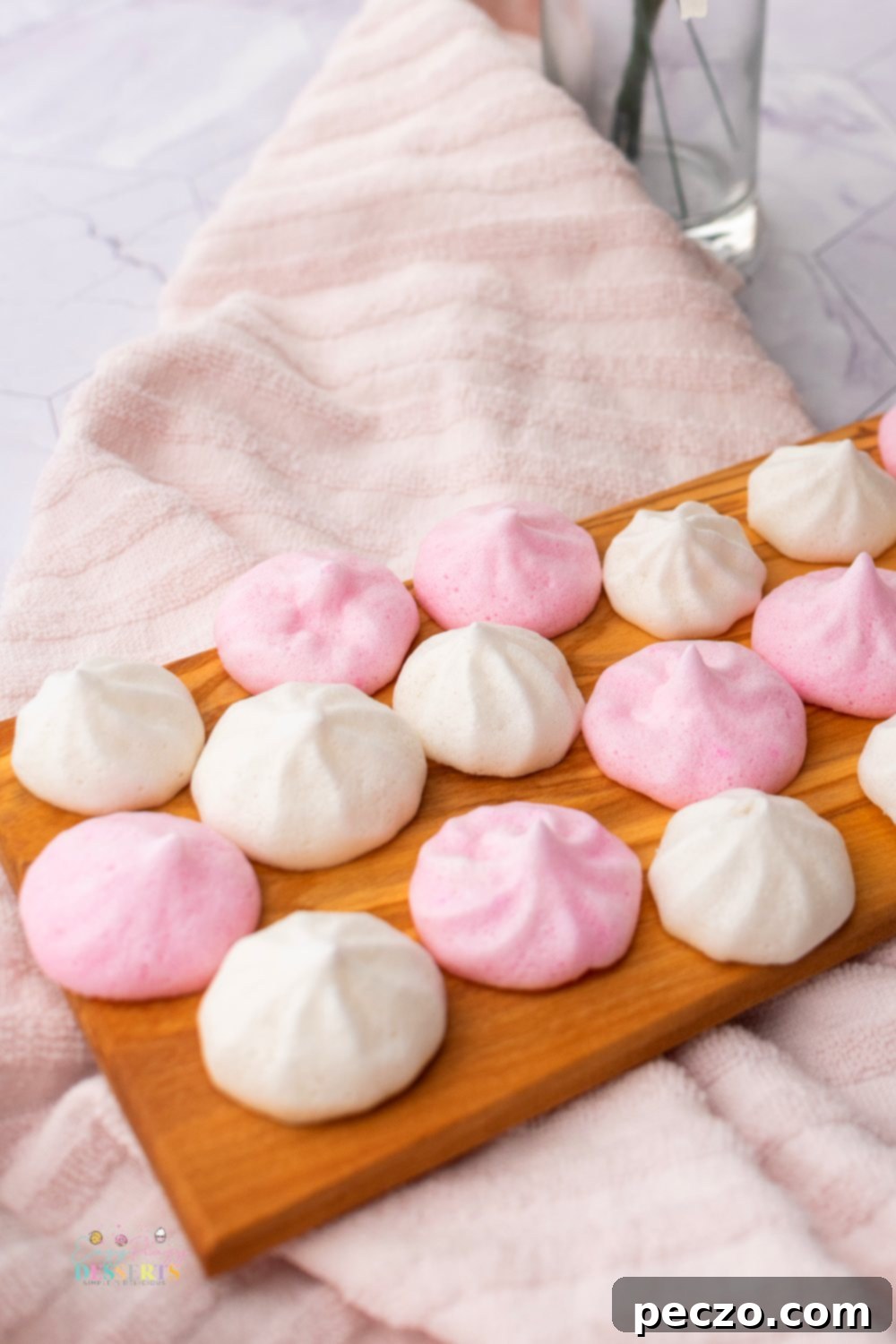
Understanding Vegan Meringue: Ingredients and Characteristics
Is Meringue Vegan? The Aquafaba Answer
The short answer for traditional meringue is no. Classic meringue relies on vigorously whisked egg whites that create a stable foam, which then bakes into a light, crispy structure. Since egg whites are an animal product, they are incompatible with a vegan diet. However, the culinary world has made incredible strides in plant-based alternatives, and meringue is no exception. With the revolutionary discovery of aquafaba, creating luscious, egg-free meringues at home has become not only possible but wonderfully straightforward. Aquafaba provides the same emulsifying, binding, and aerating properties as egg whites, making it the perfect plant-based substitute for this delicate dessert.
What is in Vegan Meringues? Simple, Wholesome Ingredients
One of the most appealing aspects of this vegan meringue recipe is its simplicity. You won’t need a pantry full of obscure ingredients; just a few basic items are sufficient to create these delightful treats. The core of this recipe is built upon three readily available components:
- Aquafaba: The star ingredient, replacing egg whites.
- Granulated Sugar: Essential for sweetness and structure.
- Lemon Juice: Acts as an acid to help stabilize the aquafaba foam.
Optionally, you can enhance the visual appeal of your meringues by adding a few drops of food coloring, allowing you to customize them for any occasion or theme. Gel food coloring is recommended for best results, as liquid food coloring can introduce too much moisture, potentially affecting the meringue’s stability.
What Do Vegan Meringues Taste Like? Pure Indulgence!
If you’re new to vegan baking, you might be wondering if an egg-free meringue can truly replicate the beloved taste and texture of its traditional counterpart. Rest assured, vegan meringues taste remarkably similar to the real thing, often indistinguishable. They offer that signature delicate sweetness, a wonderfully crispy exterior that gives way to a soft, slightly chewy interior. The beauty of using aquafaba is that it imparts no strange aftertaste or bean flavor, ensuring a clean and pure meringue experience. These cookies are fantastic on their own, or you can pair them with fresh berries, a dollop of dairy-free whipped cream, or incorporate them into larger vegan desserts.
What Do Vegan Meringues Look Like? Identical Elegance
Visually, vegan meringues are a perfect match for traditional meringues. When properly prepared, the aquafaba whips up into a glossy, white, and voluminous foam that holds its shape beautifully. Once piped onto a baking sheet and slowly baked, they achieve the same smooth, elegant exterior and often retain their vibrant color if food coloring is used. They are light, airy, and can be shaped into classic swirls, drops, or other decorative forms, making them a stunning addition to any dessert table.
Are Vegan Meringues Healthy? A Lighter Indulgence
While meringues are still a dessert containing sugar, vegan meringues offer a generally lighter and, in some aspects, healthier alternative to many other sweet treats. The three primary ingredients in this recipe contribute unique benefits:
- Aquafaba: While not a direct nutritional powerhouse like chickpeas themselves, the liquid does contain some protein and trace amounts of minerals, making it a more substantial base than just egg whites for some. It’s also cholesterol-free.
- Sugar: Our recipe calls for just 1/2 cup of sugar for approximately 20 cookies, meaning each serving contains a moderate amount of sweetness. Compared to many rich, butter-laden desserts, meringues can be a surprisingly low-fat option.
- Lemon Juice: A natural source of Vitamin C, which contributes to immune health and acts as a beneficial stabilizing agent in the meringue.
So, if you’re seeking a way to enjoy a sweet treat without derailing your healthy eating habits entirely, these vegan meringues present an excellent choice. They offer satisfaction with fewer calories and fats than many conventional desserts.
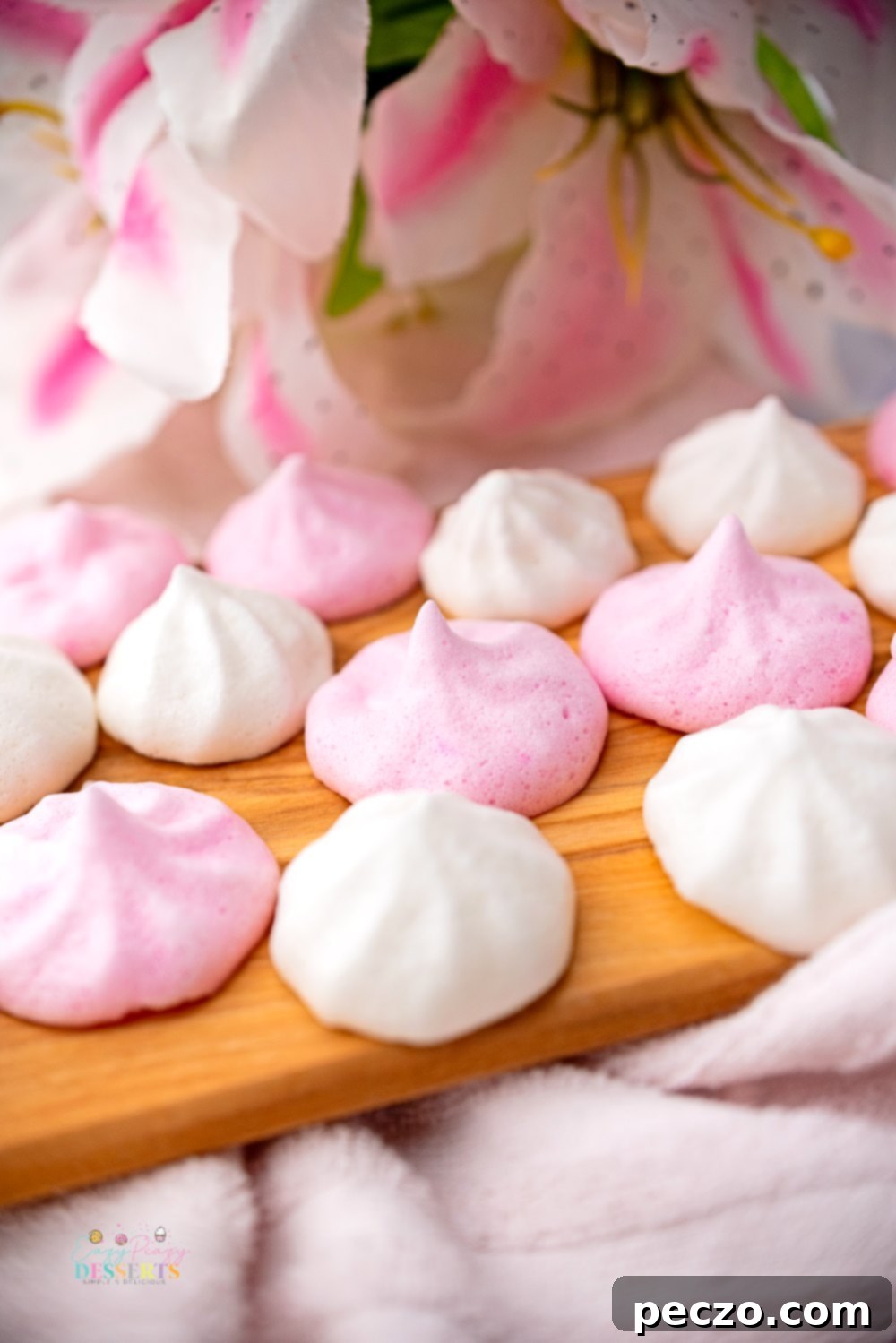
The Star Ingredient: Aquafaba – The Vegan Egg White Substitute
What Exactly is Aquafaba?
Aquafaba is a culinary marvel that has revolutionized vegan baking and cooking. It’s simply the viscous liquid found in a can of chickpeas (or other legumes) or the cooking water left over after boiling dried chickpeas. The name “aquafaba” itself comes from Latin, meaning “bean water” – a straightforward description for this incredibly versatile ingredient. This liquid contains a unique blend of proteins and starches that mimic the functional properties of egg whites, particularly their ability to emulsify, bind, thicken, and, most importantly for meringues, foam.
How to Obtain Aquafaba for Your Recipe
There are two main ways to acquire aquafaba for your vegan meringue recipe, both equally effective:
- Canned Chickpea Liquid: This is the most common and convenient method. Simply open a can of chickpeas (ensure it’s unsalted or low-sodium if possible, to avoid affecting flavor) and drain the liquid. Save the chickpeas for another delicious recipe like hummus or a salad!
- Homemade Chickpea Cooking Liquid: If you cook dried chickpeas from scratch, you can reserve the cooking water. Just be sure to cook the chickpeas until they are tender and the water is slightly thickened – this usually means cooking them longer than if you were just making them for eating whole.
This ingenious ingredient isn’t limited to meringues. Aquafaba can be used as an egg white replacement in a wide array of recipes, enabling you to transform many traditional dishes into vegan delights. Some popular applications include:
- Vegan Waffles (for lightness and binding)
- Macarons (another delicate meringue-based cookie)
- Vegan Mayonnaise (for emulsification)
- Other Cookies and Pancakes (as a binder)
- Meringue Frosting (for fluffy, stable toppings)
Tips for Making and Extracting Aquafaba
To ensure you get the best possible aquafaba for your meringues, here are a few simple steps and considerations:
- Shake the Can Before Opening: Before you open a can of chickpeas, give it a good shake. This helps to redistribute any settled starches and proteins throughout the liquid, ensuring a more consistent aquafaba.
- Use a Fine Mesh Strainer: To efficiently separate the chickpeas from the liquid, place a fine mesh strainer over a clean bowl. Pour the entire can of chickpeas into the strainer, allowing the liquid to drain freely into the bowl. Let it sit for a few minutes, gently tapping the strainer to release every last drop of the precious liquid.
- Measure Carefully: The consistency of aquafaba can vary slightly between brands or batches. For meringues, a thicker, more viscous aquafaba generally works best. If your aquafaba seems too thin, you can gently reduce it over low heat on the stovetop until it thickens, then cool it completely before using.
- Store Leftover Chickpeas: Don’t let the chickpeas go to waste! Store them in an airtight container in the refrigerator for up to 3-4 days or freeze them for longer use in other recipes.
How Much Aquafaba Can You Get from One Can?
A standard 15-ounce can of chickpeas typically yields about ¾ cup of aquafaba. This amount is usually perfect for one batch of vegan meringue cookies as detailed in this recipe. If you find yourself with extra aquafaba, don’t fret! It stores well in an airtight container in the refrigerator for up to a week, or you can freeze it in ice cube trays for up to three months, making it readily available for your next vegan baking adventure.
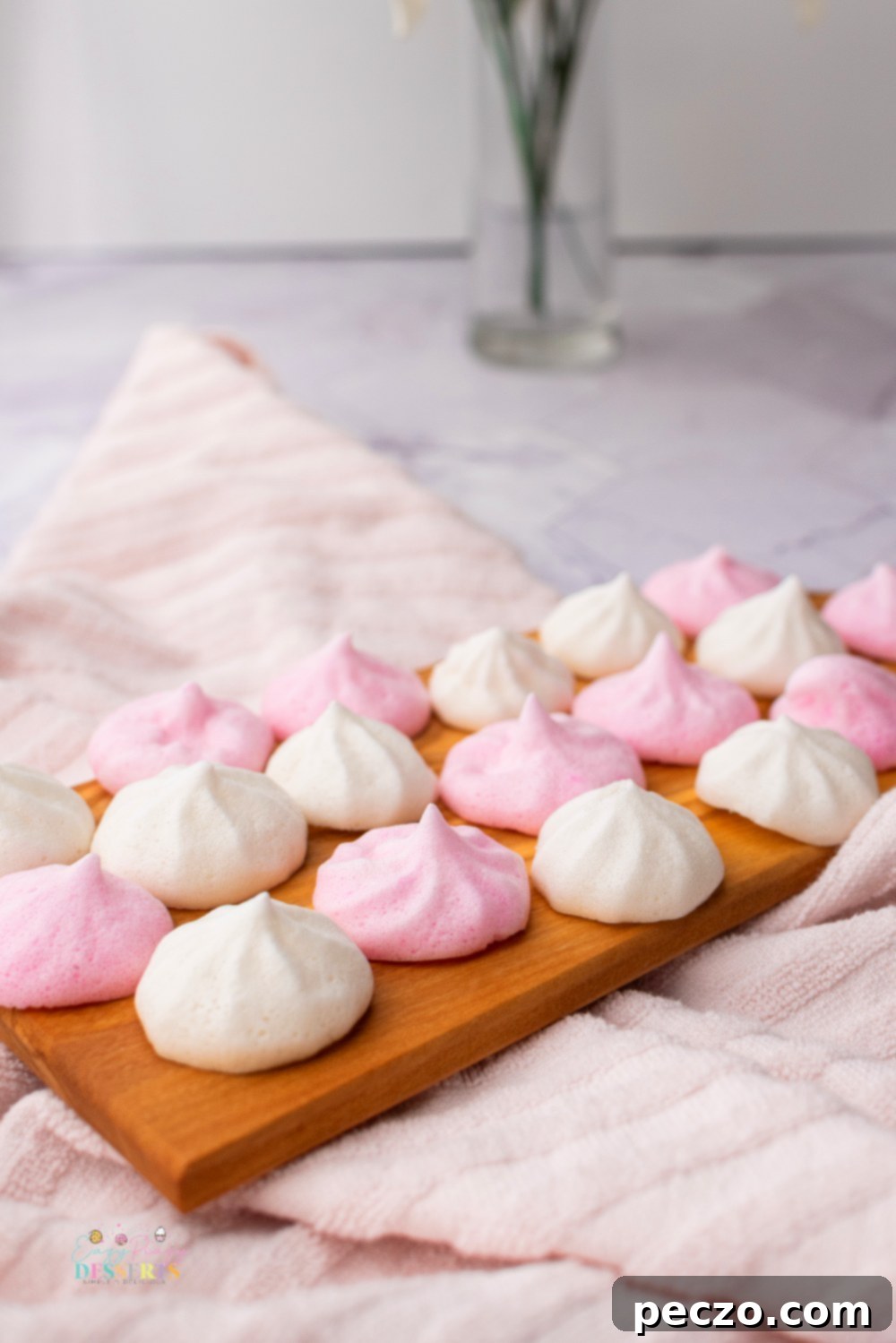
Perfecting Your Vegan Meringues: Essential Tips and Troubleshooting
Vegan Meringue Recipe Tips for Success
Achieving perfectly crisp and fluffy vegan meringues is easier than you might think, especially with these helpful tips:
- Stabilize with Cream of Tartar: While not strictly essential for every batch, adding cream of tartar can significantly improve the stability of your aquafaba foam. If, after beating the aquafaba on high for about 10 minutes, it doesn’t form fluffy, slightly stiff peaks similar to whipped cream, a small amount (around ¼ teaspoon) of cream of tartar can give it the extra boost it needs. This acidic ingredient helps strengthen the protein structure, ensuring a more robust meringue.
- Use Gel Food Coloring: Meringue can be delicate, and adding too much liquid can compromise its structure. Therefore, opt for gel food coloring over liquid varieties if you wish to add vibrant hues. Gel colors are highly concentrated, meaning you need only a tiny amount to achieve rich colors without introducing excess moisture, which could prevent your aquafaba from stiffening properly.
- Clean Equipment is Key: Just like with egg white meringues, any trace of grease or oil on your mixing bowl or whisk attachments can prevent aquafaba from whipping up properly. Ensure all your equipment is thoroughly cleaned and completely dry before you begin.
- Patience with Beating: Don’t rush the whipping process. Aquafaba can take a little longer than egg whites to reach stiff peaks, sometimes up to 10-15 minutes. Watch for the characteristic glossy, firm peaks that hold their shape when the whisk is lifted.
Why Did My Vegan Meringues Collapse? Common Troubleshooting
If your vegan meringues have collapsed or didn’t turn out as expected, don’t worry – it’s a common issue with meringue making, whether vegan or traditional. Here are the most frequent culprits and how to avoid them:
- Under-Beaten Aquafaba: This is perhaps the most common reason for collapsed meringues. Aquafaba needs sufficient time to whip up into a very stable, airy foam. It should be white, voluminous, and hold stiff peaks firmly before any sugar is introduced. If it’s too soft, it won’t be able to support the sugar and will deflate.
- Adding Too Much Sugar Too Quickly: Sugar is crucial for meringue structure, but it must be incorporated slowly and gradually. Dumping all the sugar in at once can weigh down the delicate aquafaba foam and cause it to lose its airiness, preventing it from holding its shape. Add the sugar one tablespoon at a time, allowing each addition to fully dissolve before adding the next, while the mixer is running on medium-high speed.
- Oven Temperature Too High: Meringues are “dried” rather than “baked” in the traditional sense. A high oven temperature (e.g., 350°F / 175°C) can cause the aquafaba to expand too rapidly and then collapse, leading to hollow or cracked meringues. Baking at a very low temperature (around 200°F / 95°C) for an extended period allows the meringues to dry out slowly and evenly, maintaining their structure.
- Meringue Cookies Left in the Oven Too Long or Not Long Enough: There’s a sweet spot for baking time. Overbaking can lead to extremely brittle, sometimes browned, and potentially collapsed meringues. Underbaking, on the other hand, will result in soft, chewy, or sticky meringues that haven’t fully dried out. The goal is for them to be completely dry, easily lifting off the parchment paper, and crisp throughout.
- Humidity: High humidity can be a meringue’s worst enemy. Moisture in the air makes it difficult for meringues to dry out properly, often leading to sticky or soft results. Try to make meringues on a dry day, if possible, and ensure your kitchen isn’t overly steamy during baking.
Storage and Serving Your Delicious Vegan Meringues
How Long Will Vegan Meringues Last?
Vegan meringue cookies, like their traditional counterparts, are best enjoyed fresh. However, if stored correctly, they can maintain their crispness and delightful texture for a few days. When kept in an airtight container at room temperature, away from any moisture or direct sunlight, these aquafaba cookies will last for up to three days. For optimal enjoyment of their delicate crunch, it’s always recommended to serve them as soon as they have fully cooled after baking.
How to Store Vegan Meringues Properly
Due to their delicate nature and sensitivity to moisture, proper storage is crucial for preserving the quality of your vegan meringues. Follow these guidelines:
- Airtight Container: Always store meringues in an airtight container. This is the most important step to protect them from humidity in the air.
- Room Temperature: Keep the container at room temperature. Refrigeration can introduce moisture and cause them to become sticky or chewy.
- Avoid Humidity: Store them in a cool, dry place. If you live in a particularly humid environment, you might find their shelf life to be shorter.
Can You Freeze Vegan Meringue Cookies?
Freezing is generally not recommended for vegan meringue cookies, as it can severely impact their texture. The freezing and thawing process tends to introduce moisture, which causes meringues to become soft, sticky, and lose their signature crispness. Given that this recipe yields approximately 20 delightful cookies, they are usually devoured quickly. For best results and to fully appreciate their delicate structure, consume them within a few days of baking, stored at room temperature in an airtight container.
Serving Suggestions for Vegan Meringues
These versatile vegan meringues can be enjoyed in many ways:
- Simply Delicious: Enjoy them plain as a light, sweet snack.
- With Fresh Fruit: Pair them with fresh berries, sliced peaches, or kiwi for a delightful contrast in textures and flavors.
- Dessert Topping: Crush them lightly and sprinkle over dairy-free ice cream, puddings, or fruit salads for an added crunch.
- As a Component: Use them as a base for mini vegan pavlovas or lemon meringue pie components.
Now that you’re equipped with all the knowledge and tips for making perfect vegan meringues, whipping up a batch of these exquisite cookies should be a truly enjoyable experience. This aquafaba meringue recipe is a testament to the incredible possibilities of plant-based baking, proving that you don’t need eggs to create light, crispy, and utterly delicious treats. We hope you and your loved ones enjoy these amazing vegan meringue cookies!
If you have any further questions about the recipe or successful meringue making, please don’t hesitate to leave a comment below. And of course, if you loved this recipe, please share it with your friends and family so they too can discover the joy of egg-free meringues!
Pin to Save for Later
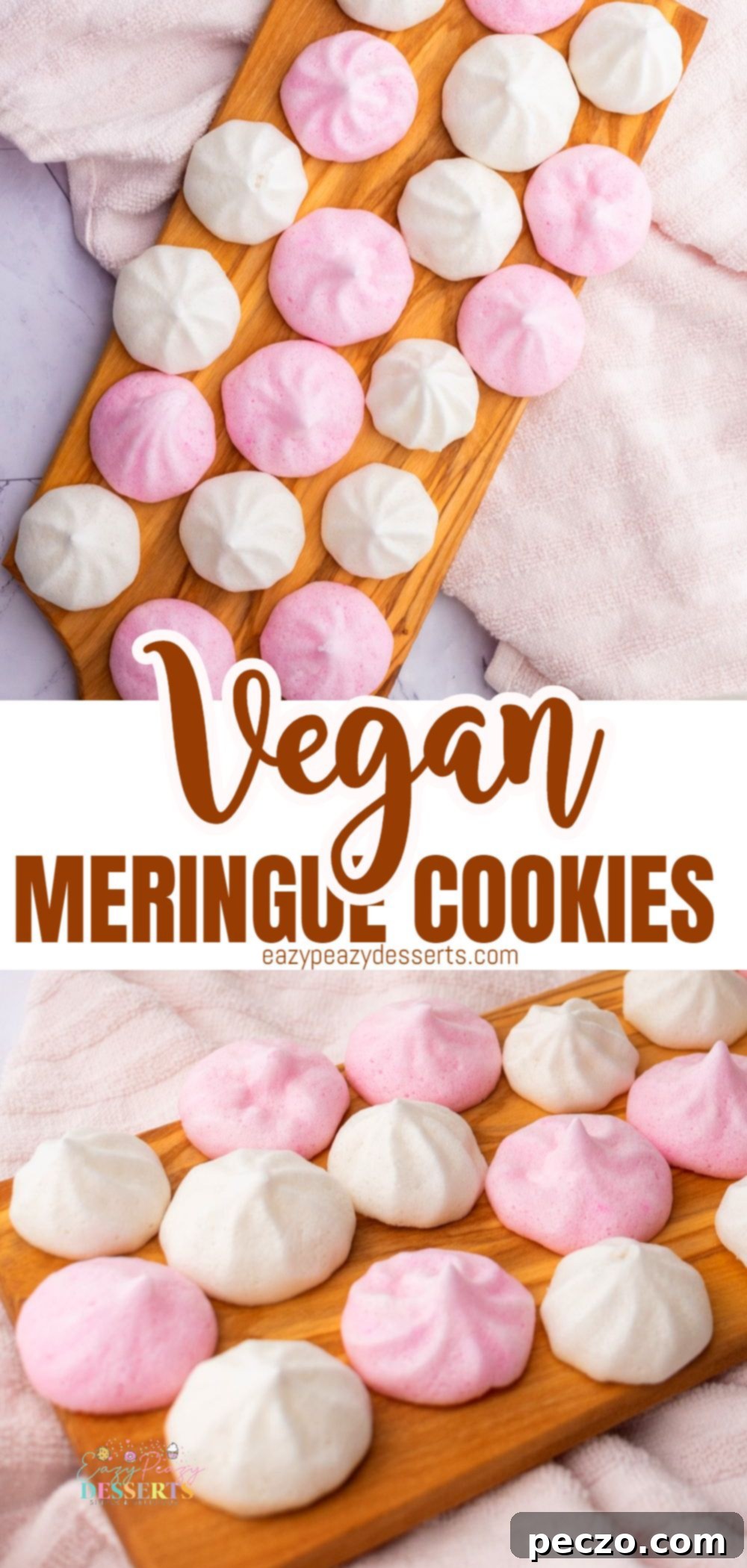
Just for You!
Sign up & get a FREE e-Cookbook: 9 Puff Pastry Desserts!
Print the Recipe Card
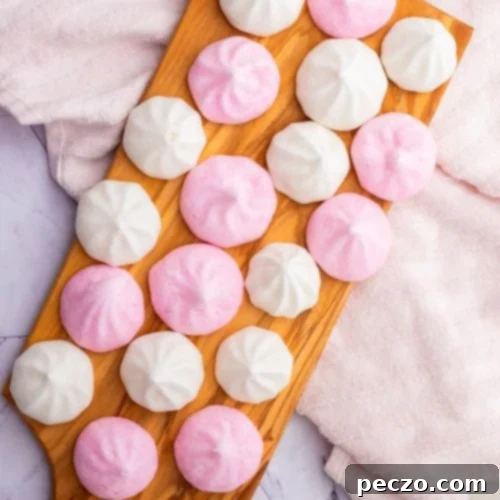
Vegan Meringue Cookies
Do you love meringue? If so, then you’ll love my recipe for vegan meringue cookies. They are the perfect combination of crispy and chewy with a light sweetness that will make your mouth water.
Equipment
- Piping bag
- Baking sheet
- Parchment paper or silicone mats
- Stand mixer
Ingredients
- 1 can chickpeas (aquafaba only)
- ½ cup granulated sugar
- Juice of ½ lemon
- Food coloring (optional, gel recommended)
Instructions
-
Preheat your oven to 200°F (95°C). Prepare two baking sheets by lining them with parchment paper. Carefully drain the liquid from your can of chickpeas, ensuring all the aquafaba is collected and reserved. You should typically get a little over ¾ cup of aquafaba from a standard 15-ounce can.

-
Pour the collected aquafaba and the juice of half a lemon into the bowl of your stand mixer. Whip on high speed for approximately 10 minutes. The mixture should significantly expand, become opaque, and form stiff peaks, resembling a thick whipped cream consistency.

-
While the mixer is still running on medium-high speed, gradually add the granulated sugar, one tablespoon at a time. Ensure each addition is fully incorporated before adding the next. Continue mixing until the meringue is glossy, firm, and holds very stiff peaks.

-
If using, gently fold in your gel food coloring at this stage until the desired color is achieved. Transfer the whipped aquafaba meringue into a piping bag fitted with your desired tip. Pipe small dollops, no larger than a quarter, onto the prepared baking sheets, leaving a little space between each as they will expand slightly during baking.

-
Bake in the preheated oven for 90 minutes to 1 hour 30 minutes, or until the meringues are completely dry and crisp throughout. Baking time can vary depending on the size of your meringues and your oven. Keep a close eye on them to prevent over-browning. Once baked, turn off the oven and allow the meringues to cool completely inside the oven with the door slightly ajar. This helps them dry out further and prevents cracking.

Nutrition Information (per 1 cookie serving)
- Calories: 20 kcal
- Carbohydrates: 5g
- Protein: 1g
- Fat: 1g
- Saturated Fat: 1g
- Polyunsaturated Fat: 1g
- Monounsaturated Fat: 1g
- Sodium: 1mg
- Potassium: 4mg
- Fiber: 1g
- Sugar: 5g
- Vitamin A: 1 IU
- Vitamin C: 1mg
- Calcium: 1mg
- Iron: 1mg
Keywords: lemon meringue cookies, vegan meringue, vegan meringue cookies, aquafaba meringue, egg-free dessert
Tried this recipe? Let us know how it was!
